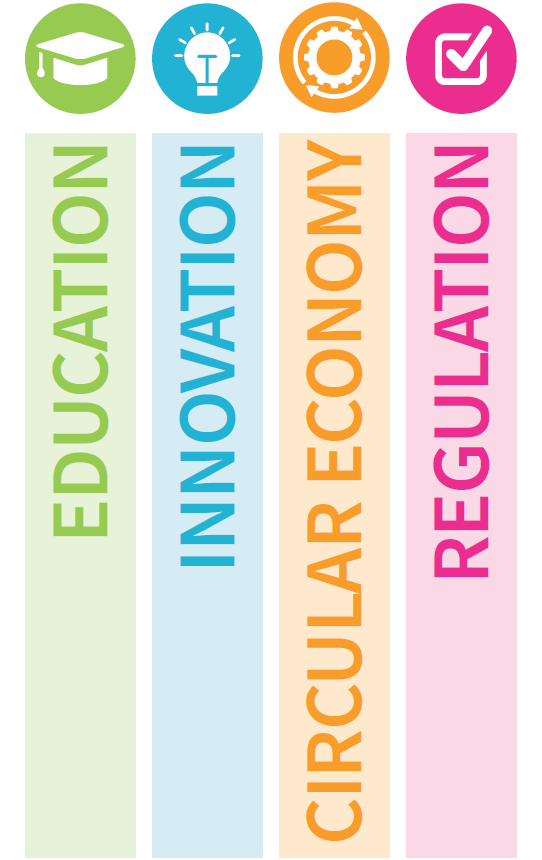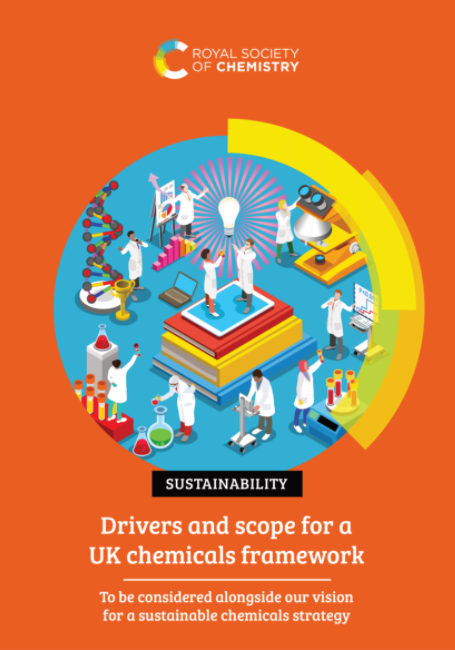Current international attempts at the massive undertaking of addressing chemical pollution are not working. For the world to solve the major environmental and health challenges we face, there must be a sustainable chemicals revolution. We can only achieve this through senior-level engagement with the chemical sciences community through an authoritative, intergovernmental science-policy interface. Read on to find out how.
On this page
- UN Science-Policy Panel (SPP) on Chemicals, Waste, and the Prevention of Pollution
- The drivers and scope for a new UK-wide chemicals framework
- Chemicals strategy - four pillars
- Per- and polyfluoroalkyl substances (PFAS)
- Solving the challenges of PFAS - our introductory workshop
- Tackling Contaminants of Emerging Concern (CECs) in water
- European Chemicals Strategy for Sustainability
Roundtables to help negotiations to establish the SPP and how it will be run
In January 2022, we jointly hosted the Burlington Consensus with Defra. This was a roundtable of policymakers, academia, regulators and industry. Defra Minister Jo Churchill provided the opening remarks and the outcomes of the discussions aided negotiations at UNEA 5.2 in March, where the resolution to establish the SPP was successfully adopted.
There will be a new science policy panel for chemicals, waste and pollution. The question is now about scope, priorities and how it will run. Together with Defra, we held a follow-up meeting in December 2022, the Burlington Consensus 2. The dialogue continued with our members and international partners on how to incorporate scientific knowledge from all regions and the current issues of international importance that the panel could prioritise.
Watch recordings of the meetings
Burlington Consensus recording - science and policy's call for a global panel on chemicals, waste and pollution:
Burlington Consensus 2 recording - a new UN science-policy panel for chemicals, waste and pollution prevention:
Open-Ended Working Group meetings
The first Open-Ended Working Group (OEWG) meeting was held in October, and established the OEWG Bureau and its rules of procedure.
A full formal OEWG was held on 30 January-4 February 2023, to discuss governance procedures for the panel, function, scope and priorities for assessment. More information about the process can be found on the . We were in attendance as an accredited UNEP stakeholder.
Download the policy position on the need to establish a new science-policy interface.
Download the policy position on operating principles for the new SPP.
The second OEWG meeting was in Nairobi on 11-15 December, 2023. Topics of discussion included operating principles, scope and functions of the panel, conflict of interest procedures, and capacity building, with other issues added as they arose. We submitted a written statement on the topics discussed at this meeting. At the event, we also helped to coordinate the efforts of Science and Technology Major Group, of which we are a member.
The UK context for a new chemicals framework
From 1 January 2021, the UK must decide how chemicals will be managed, noting that Northern Ireland, under the NI protocol continues to operate under EU law. Building on our initial vision for chemicals strategy, we have drafted a document outlining the drivers and scope for a new UK-wide chemicals framework.
One of the key areas of the chemicals strategy is the implementation of a UK REACH regulation applicable within Great Britain. Firstly, the government have prioritised a risk management options analysis (RMOA) of as part of the first phase of restriction work under UK REACH. We are bringing our community’s perspective and scientific evidence on PFAS to the relevant forums as the policy work progresses.
Chemicals strategy - four pillars
Download the full policy position where we present our vision statements for each pillar of a future chemicals strategy on a 2030 horizon.

Enablers
- Research and new knowledge
- Data
- Evidence
- Digital
Resources
- Funding
- Skills and workforce
- Infrastructure
Governance
- An efficient and accountable decision-making framework
Per- and polyfluoroalkyl substances (PFAS)
Per-and poly-fluoroalkyl substances (PFASs) are widely used chemicals containing the perfluorocarbon moiety. They are known for their unique water, oil, heat, stain, as well as grease repellent properties. PFASs are used in various products such as fire-fighting foam, protective clothing, furniture, adhesives, food packaging, heat-resistant non-stick cooking surfaces, and insulation of electrical wires.
The carbon-fluoride bond is one of the strongest in nature, making these substances highly persistent and bio-accumulative. PFASs can contaminate soil and drinking water sources and have been found in rivers and lakes. Combined with their widespread use and increasing evidence of toxicity, concerns are being raised about their impact on human health and the environment.
In the UK, we must urgently address PFAS water pollution to minimise the potential for negative health effects today and in future generations. By implementing stronger regulatory controls on PFAS in drinking water, the UK has an opportunity to show international leadership in managing chemicals in the environment and furthering the UN Sustainable Development Goals (SDGs), especially SDG6 on clean water.
![]() Download our PFAS in UK Drinking Water position statement
Download our PFAS in UK Drinking Water position statement
![]() Watch the presentations from our workshop on PFAS alternatives
Watch the presentations from our workshop on PFAS alternatives
The , was signed in 2015, by scientists from around the world calling on scientists, governments, manufacturers, and consumers to take actions to limit PFAS production and use.
The Stockholm Convention has recently classified certain PFASs under Annex A, meaning all signatories must eliminate their use. Exemptions are made for semiconductor manufacturing, protective industrial clothing, medical devices, and some fire-fighting devices.
European Union's Registration, Evaluation, Authorisation and Restriction of Chemicals (EU REACH) has classified PFAS into a single group encompassing approximately 4700 substances. Planned EU aims to create "Essential Use concept", for the broad restriction of PFAS.
Following from the United Kingdom's exit from the EU, GB REACH was created to develop the UK's future chemicals regulatory framework. Northern Ireland is excluded from the framework based on the Northern Ireland protocol of the Brexit Trade and Cooperation Agreement.
We also held an event in June 2022 on Risk and Essential Use. As part of the discussions on a UK Chemical Strategy, the government needs to find pragmatic and proportionate ways forward in chemical risk management and decision-making that society can trust to keep them safe whilst enabling innovation. At the event, we discussed these issues with around 60 delegates, bringing natural scientists, social scientists and policymakers together to discuss risk and precaution in chemicals policy and chemicals safety decision-making. A report on the contents of the workshop can be downloaded below:
We believe that the chemical sciences are making an important contribution. We have developed our initial policy position on risk-based regulation for PFAS, including our proposal of a 'traffic light' approach to prioritisation, and you can download that below:
![]() Download PFAS policy position here
Download PFAS policy position here
Solving the challenges of PFAS - our introductory workshop
We held the above in March 2020. The workshop illustrated how our four pillars for a sustainable chemicals strategy can be applied to this example:
- Education: the use of the precautionary principle, the risk & impact principle and essentiality criteria as a societal basis for policy-making
- Regulation: grouping of PFAS to facilitate efficient regulation
- Innovation: (i) remediation technologies for addressing legacy PFAS contamination (ii) PFAS substitution in products – opportunities, challenges and unintended consequences
- Circular Economy: issues with PFAS in product recycling and waste – is a circular economy approach feasible for PFAS?
Listen to the speakers at our workshop
Our events on PFAS were chaired by of Manchester Metropolitan University. Speakers at the March workshop have made their presentations available to download below:
![]() Â鶹AV science policy work on PFAS: Camilla Alexander-White
Â鶹AV science policy work on PFAS: Camilla Alexander-White
![]() What’s wrong with persistence - don’t we want to build things to last?: Ian Ross Ph.D. - Tetra Tech
What’s wrong with persistence - don’t we want to build things to last?: Ian Ross Ph.D. - Tetra Tech
![]() Revised TWI for PFASs: rationale and consequences - Martin Rose - University of Manchester
Revised TWI for PFASs: rationale and consequences - Martin Rose - University of Manchester
![]() Challenges for PFAS remediation - Madeleine Bussemaker - University of Surrey
Challenges for PFAS remediation - Madeleine Bussemaker - University of Surrey
Tackling Contaminants of Emerging Concern (CECs) in water
Pollution in water is driving an unprecedented global crisis. Water bodies – lakes, rivers, groundwaters, coastal waters and oceans – make up 71% of the Earth’s surface, yet they are widely contaminated with toxic chemicals and plastics.
Contaminants of Emerging Concern (CECs) represent a troubling subset of pollutants, which are often unregulated and poorly understood. However, what is well-evidenced is that they impact our environment, resulting in adverse consequences for ecosystems and human health.
We urgently need a comprehensive approach to CECs that complements remediation strategies and combines monitoring, regulation, interdisciplinary research and collaboration.
Download our position statement: Tackling Contaminants of Emerging Concern (CECs) in water
Download our short explainer: Stemming the tide of Contaminants of Emerging Concern (CECs) in water
Â鶹AV Members' resources
If you are an Â鶹AV member working with young people or public audiences on cleaning up water and are looking for engagement and outreach ideas you can use .
European Chemicals Strategy for Sustainability
In line with the , the strives for a toxic-free environment, where chemicals are produced and used in a way that maximises their contribution to society, while avoiding harm to the planet and to current and future generations. This will be achieved by simplifying the fragmented EU chemicals regulatory system and revision of REACH regulations. The European Commission published a chemicals strategy for sustainability in October 2020 outlining an extensive agenda.
The Commission aims to extend its generic approach to risk management to ensure that consumer products do not contain chemicals that cause cancers, gene mutations, affect the reproductive or the endocrine system, or are persistent and bio-accumulative (such as PFAS). The chemicals strategy explores the possibility of shifting from traditional production and use of chemicals to "chemicals as a service". Chemical risk assessments will also take into account the cocktail effect of chemical mixtures, group persistent chemicals for their phasing out and regulation, and properly define the criteria for essential uses of these chemicals across EU legislation.
The Commission aims to boost use of digital tools and establish a research and innovation agenda, to ensure a coordinated exchange of information on enforcement of chemical legislation and harmonised EU-wide response. The strategy intends to move towards toxic-free material cycles and clean recycling to ensure that substances of concern in products and recycled materials are minimised.
The EU also aims to step up its international advocacy to meet the through international cooperation and promoting its high standards by not exporting chemicals banned in the EU.
Recently, the EU has established a and EUCheMS is a member of this group. As members of EUCheMS, the Â鶹AV will collaborate with our EU partners to help ensure the best science feeds into the EC endeavour.
Related pages
- Laboratories are working to reduce the carbon footprint of their research
- Our policy on the circular economy of precious metals
- How can we make paint more sustainable?
- Chemistry can help the composites sector move towards more sustainable practices
- A task force of industry leaders are working with us to make polymers in liquid formulations more sustainable
- Listen to our award winning podcasts covering many aspects of sustainability
- Our other environmental and sustainability work
- See all our policies, reports, evidence and campaigns


